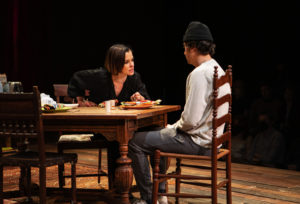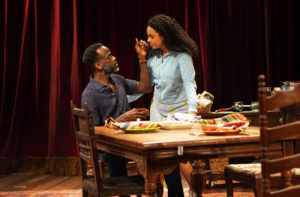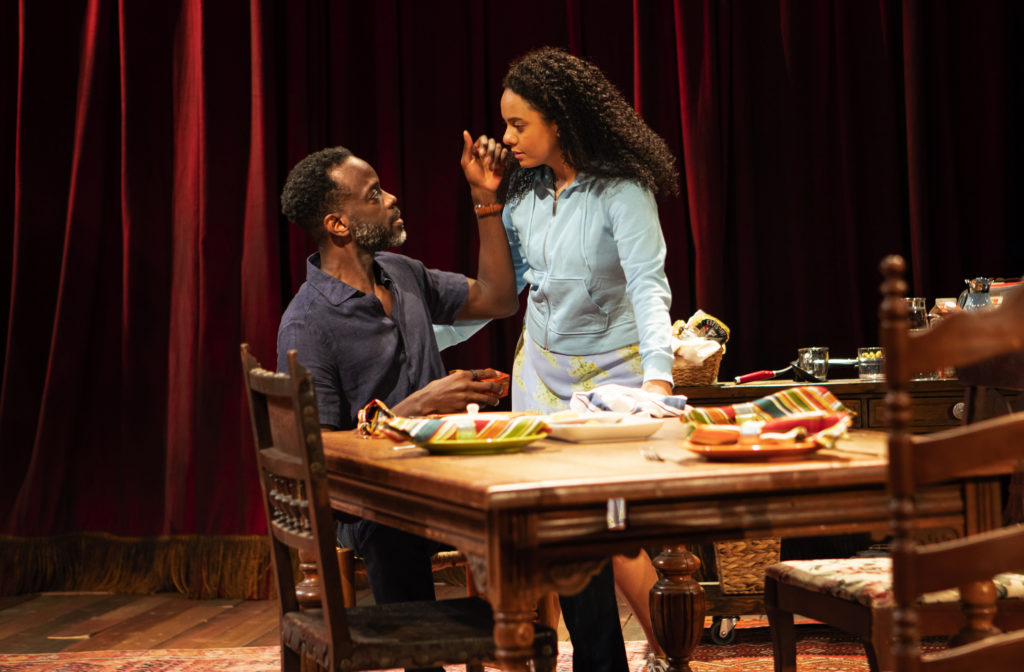Wandering Through the Country
A Chekhov Update is Well-Done and Timely
BY CHRISTOPHER BYRNE
Is there any reason to revise and update one of Chekhov’s most famous plays, The Seagull? The exercise, at least in the abstract, seems to be something my mother would have called “coals to Newcastle,” or something that isn’t necessary. After all, Chekhov’s mordant comedy and observation of unrequited love, lost passion, the pursuit of “art,” and staggeringly ordinary people thinking themselves something special is nearly perfect as it is.

Then, one encounters Thomas Bradshaw’s take on it, The Seagull/Woodstock, NY, and all bets are off. While a staging of the original would certainly lead a contemporary audience, perhaps, to see the story’s relevance to—and reflection of—our contemporary culture, Bradshaw blows right past any subtle implications with meticulous time travel—and an acid-etched sense of humor—transplants the countryside outside Moscow in 1896 to the Berkshires in 2023. The cast of characters is virtually unchanged, from Chekhov, though marvelously updated. We have a self-reverential actress Irene (“theater famous, not famous famous”), her writer lover William, her tortured son Kevin who wants to revolutionize theater; Kevin’s leading lady and muse Nina, and a handful of others who have all come to a home in Woodstock, for a series of weekends in the country, so to speak.
Chekhov, in the original, ruthlessly satires his characters, and Bradshaw does the same. Where Chekhov’s Arkadina violates the Russian acting teacher Stanislavski’s admonition to “love the are in yourself, not yourself in the art,” Bradshaw’s Irene takes it even further in to an orgy of clueless solipsism and unabashed name dropping with references to Terrence McNally, Arthur Miller, regional theaters, the British star Janet McTeer (with whom Irene did an all-female True West in London), and many more. Irene’s son Kevin (Konstantin in the original) writes a perfectly ghastly play, the highlight of which are fart jokes and masturbation, all wrapped in relentless self-indulgence, and when Irene belittles it, Kevin’s petulance is absolutely contemporary—a millennial who is not praised simply for showing up. (Konstantin tries to revolutionize what he saw as the false theater of his time.) The writer William produces successful, albeit shallow, novels, and the excerpts that are read are truly cringe-inducing but have made him famous, wealthy, and beloved, even if the critics, apparently correctly, don’t like his work. Bradshaw is clearly taking aim at popular culture and sending up our world’s obsession with fame and success, quality and real art be damned. It’s delicious.

Despite the fact that Kevin finally writes some successful books, and Nina does become an actress, though she’s playing Nora in A Doll’s House in a regional theater, they are both unsatisfied with their lives, leading Kevin to finally take his own. Bradshaw’s parade of delusional dilletantes is beautifully crafted, and it’s clear that his clear-eyed assessment of his characters and their foibles is as precise and engaging as Chekhov’s. To that end, one needn’t know the original to enjoy this, but it does add to the appreciation of what Bradshaw has done. It’s also highly likely that the audiences this will appeal to will have at least a passing, survey course, familiarity with the Chekhov.
Bradshaw’s play is getting a first-rate production at The New Group under the direction of Scott Elliott. It’s sharply focused to create the sense of the world the characters inhabit on Derek McLane’s mostly bare platform stage. Elliott captures the sometimes languid, sometimes manic energy of city people in the country in a way that amplifies the characters’ frustration, disappointment, and heartbreak.

The company is outstanding. Led by Parker Posey as Irene, she provides a complex portrait of ego and neurosis that charms—and annoys—those around her. Her Irene demands attention even to the point of insensitivity to others. She may be sick of self- love (as Shakespeare might call it), but she can’t be ignored. Natt Wolff is excellent as Kevin, somewhere between a spoiled brat and a tortured artist, never comfortable in his own skin. Aleyse Shannon is excellent as Nina, particularly in the second act when she’s had to accept that her reality doesn’t quite fulfill her youthful dreams and that no amount of success—or at least work—can alleviate her gnawing sadness. Atto Essandoh is suavely sexy, though William’s selfishness and willingness to use Nina merely for sex stands in direct opposition to the romantic piffle with which he fills his books. The rest of the company is excellent as well, particularly Hari Nef as Sasha, who suffers from her unrequited love of Kevin and settles down with the loving but bland local boy Mark, played by a charming Patrick Foley with a straightforward innocence and directness that is a foil to all the fools running about the place, including Sasha who can’t appreciate a good man who’s right in front of her.
This is probably where we should put in a comment about the “timelessness” of Chekhov, and though that might sound like a cliché, it’s nonetheless true. Yet how much fun is it to get all of that and be timely, too.
The Seagull/Woodstock, NY
The New Group at Signature
480 West 42nd Street
Tues-Fri 7:30 p.m.; Sat, Sun 2 p.m. through April 9
Tickets from $39 available here.
Production photos by Monique Carboni








More Stories
Off-Broadway Review: Trophy Boys
Broadway Preview: Lewis Flinn’s Cabaret
Off-Broadway Revew: The Imaginary Invalid